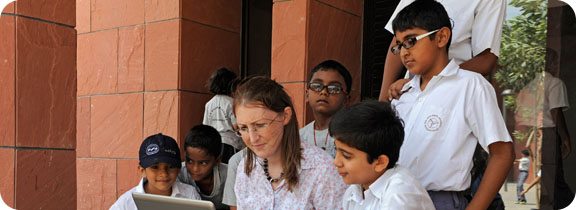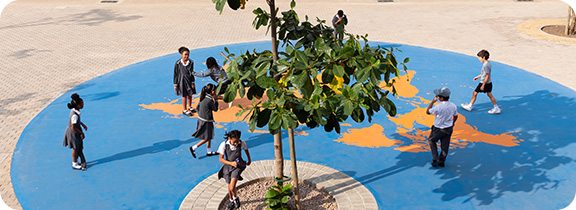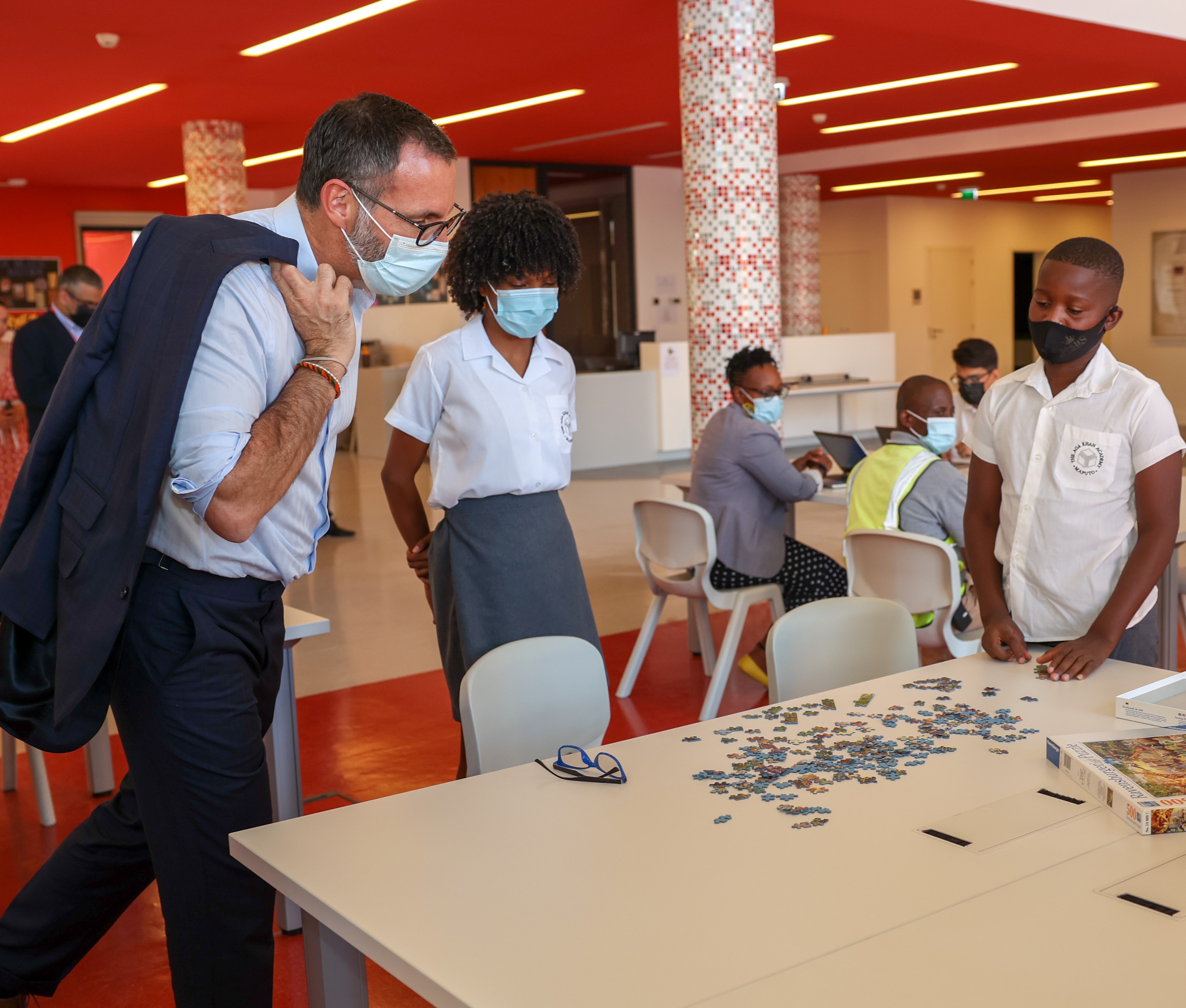
Teacher Resources
The Aga Khan Academies work to develop curriculum units that are relevant to cultural contexts of schools in the developing world. These resources develop students’ understanding of the Aga Khan Curricular Strands – Ethics, Pluralism, Cultures (with an emphasis on Muslim civilisations), Governance and Civil Society, and Economics for Development.
Resources are freely available for schools to download and use for education purposes, with appropriate attribution. We would welcome feedback about your experiences using these resources in your school. If you have comments, ideas for improvements, or would simply like to know more about our work, please send an email to: curriculum@agakhanacademies.org.
The Aga Khan Trust for Culture
The following units have been developed as part of a collaborative project between the Aga Khan Academies and the Aga Khan Trust for Culture. They follow the guidelines for IB Middle Years Programme (MYP) units, but can be used in any curriculum.
Parks and Gardens as Sanctuaries: an interdisciplinary unit for MYP1 students bringing together learning from language and literature or language acquisition (Phases 3-5) and the arts.
- Teachers' Guide
- Companion Slides
- Case Study (English language acquisition)
- Case Study (English language and literature)
Evolving Identities and Navigating Cultures: a unit to promote student well-being, which could be used as part of a pastoral or PSHE programme in MYP2.
Musical Expression is a Universal Feature of Human Experience: a music unit for students in MYP4 or MYP5.
Treasures of the Silk Routes
Treasures of the Silk Routes: Interdisciplinary Unit Planner
Treasures of the Silk Routes: Teachers' Guide
Treasures of the Silk Routes: Objects from the Aga Khan Museum Collection (slideshow)

Why Choose the Aga Khan Academy Maputo
Admission to the Aga Khan Academy Maputo is based on merit. This is broadly defined as exceptional intellectual potential, leadership, a commitment to learning, a strong sense of integrity, and the desire to work towards and instigate positive change.
As part of a network of Academies, we aim to provide exceptional students, from all backgrounds, with an outstanding education.
We seek students representing a diverse range of economic, cultural, ethnic and religious backgrounds. We look for students who have the ability and motivation to excel academically and who are or will be capable of demonstrating leadership in community service and other co-curricular pursuits.
"But above all, it is my hope that these schools will stimulate creativity, intellectual curiosity and honest inquiry so that their students can adapt and thrive in a world of rapid change; can make informed judgements on life’s daily challenges, and place those judgements in an ethical framework."We are more than just schools that strive to give their students a sound academic foundation. We emphasise the importance of academic excellence while instilling in students a sense of civic responsibility and the desire, ability and commitment to give back to their communities locally and globally.
Our educational approach measures success not just by academic achievement, but how students apply what they know to make the world a better place.
The overall educational programme is designed to foster students’ curiosity while providing them with the skills and intellectual confidence to engage with what they do not know and find answers and solutions.
Rebecca Nichols: Seeing Endless Possibilities for the Future of AKA Maputo
Engaging Students to Become Stake-Holders in the Future of the Academy
For the Middle Years Programme (MYP) Coordinator, Rebecca Nichols, the sky is the limit when envisaging the future of the Aga Khan Academy in Maputo, Mozambique. More importantly, in her eyes, how the Academy keeps growing, shaping and expanding its role in the country and beyond must lie in the hands of students.
“I would like to see our students take responsibility for what our school should become,” she states with excitement, squarely placing the emphasis on student-centred leadership. “I look forward to hearing their ideas for new initiatives, and I look forward to AKA Maputo becoming a school on the African continent from which leaders emerge,” she adds with resolute clarity.
Listening to the details of Rebecca’s background, education, and experience is highly entrancing. Born in the United Kingdom, she spent the early years of her life in Kenya before moving to the Ashanti Goldfields in Ghana for a few years and then back to Great Britain where she obtained her university-level education.
Armed with Master’s Degree in Education from the University of Bath and a post-graduate certificate in Education from the University of Sheffield, Rebecca has taught schools in Portugal, Angola, Kenya, Sweden, Spain, Italy and Hong Kong. In addition, she has worked as an International Baccalaureate (IB) Diploma examiner, an MYP workshop leader and an independent educational consultant for schools in various parts of the world. She is currently pursuing a Doctorate Degree in Education. A British citizen, Rebecca says of her background, I think of myself as a transcultural, rather than someone who identifies particularly with the UK.”
The Academy’s IB Programme is rich in Curricular Strands of ethics, pluralism, economics for development, cultures, governance, and civil society. These play a vital role in Rebecca’s teaching as she incorporates them in her instruction.
“I teach English language and literature and am always able to explore texts and language through the lens of the IB Programme’s Curricular strands,” she notes. “Currently, some of my grade 6 and grade 7 students and are studying Shakespeare’s ‘The Tempest,” and we have explored the themes of governance and civil society in the play.”
Mutual respect and mutual trust between students and also between students and teachers are of paramount value for a thriving classroom. How does Rebecca ensure that this environment exists in her classroom?
“By listening to one another. By supporting one another. By helping one another reach their potential.”
Recognising the importance the Academy attaches to incorporating pluralism and the one-family feeling in the school, Rebecca states of the teachers, “We do a lot of work on team- building activities and also try to engage our students in undertakings that will enable them to develop a sense of community, a sense of family.”
Students, too, participate in this responsibility of developing a sense of belonging. “Our students have set up an after-school programme called “Teen Talks” that enables them to discuss their feelings, experiences and, concerns,” Rebecca says. “Their openness to one another ensures that a climate of pluralism flourishes within the Academy.”
Although Rebecca values her students and works hard to educate them, she feels an excellent education must involve parents. “Any outstanding education must involve three parties; the students, the parents/guardians and the teachers,” Rebecca is quick to note. “I communicate a lot with parents through monthly coffee mornings, emails and events to which parents are invited. I especially look forward to the parent-teacher conferences.”
Radiating ambition for her students to become independent thinkers, even while working in groups, Rebecca designs projects that foster independent thinking skills.
“I create exciting, relevant units of work that expose them to a range of language and literature from a variety of contexts,” she states. I encourage them to be creative, to work independently, in pairs and as part of a group. I provide detailed feedback and expect students to be able to provide meaningful feedback to one another,” she pauses. And then continues, “I encourage them to take risks, to read widely and to learn about the world beyond our campus fences. I encourage them to try things they have never done before.”
Cherishing her time at the Academy, Rebecca feels the experience she is acquiring will continue to resonate with her throughout her life. “Working at the Academy has enabled me to become a more effective multitasker who is willing and able to take on a wide variety of roles that support teaching and learning,” she muses. “I believe that this is an exciting time for the Academy and look forward to being part of the journey.”


